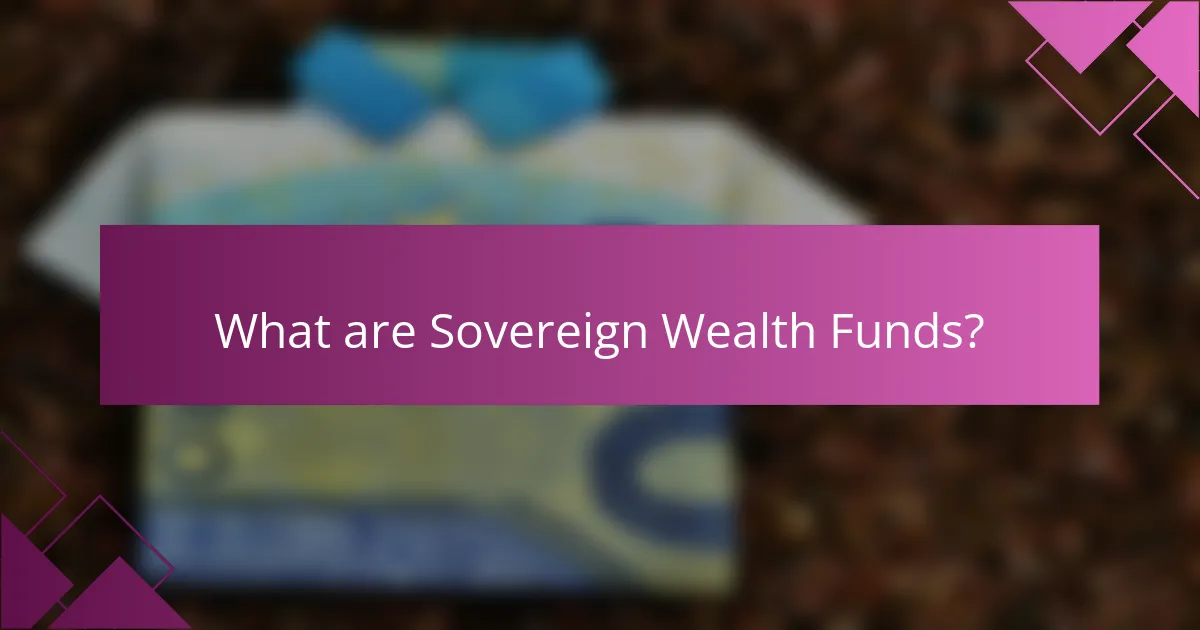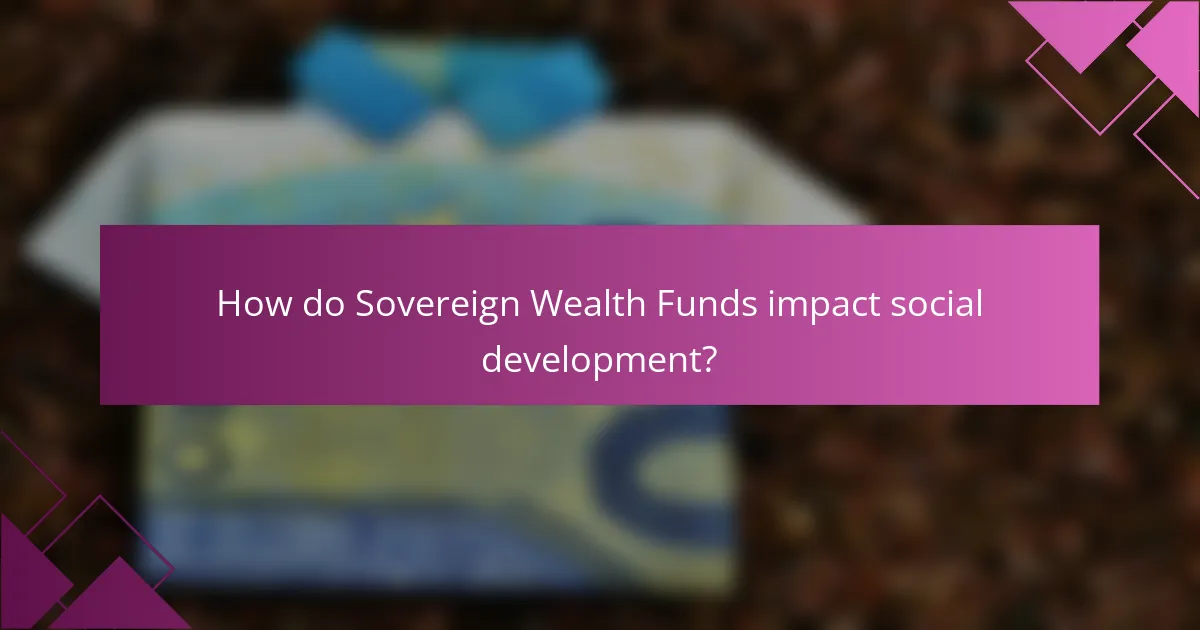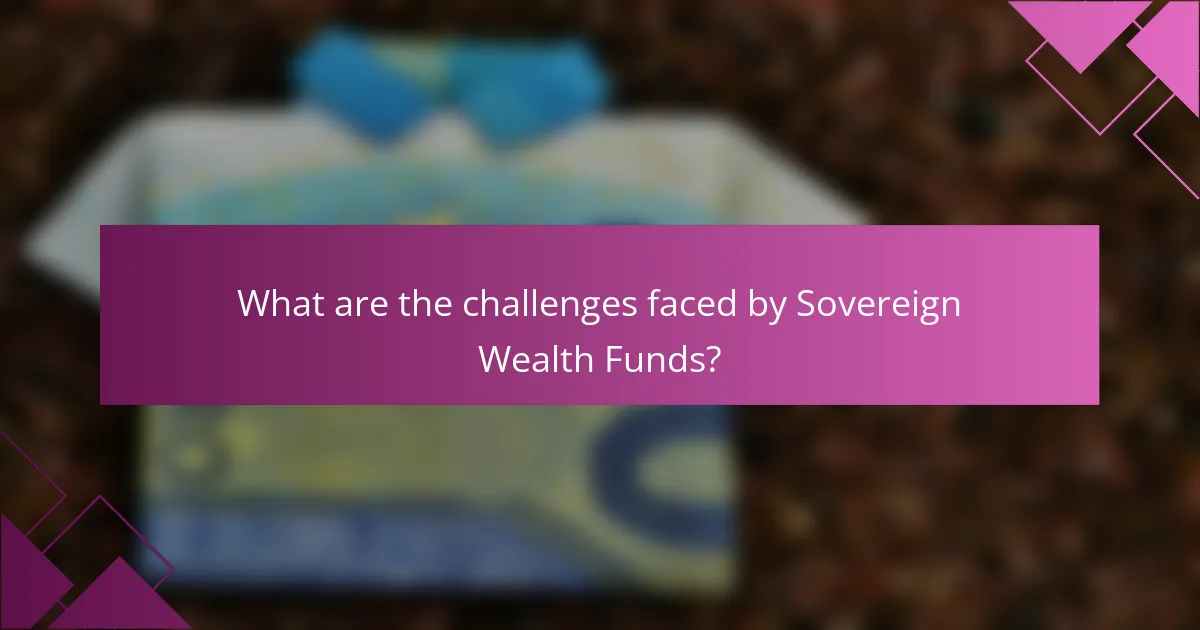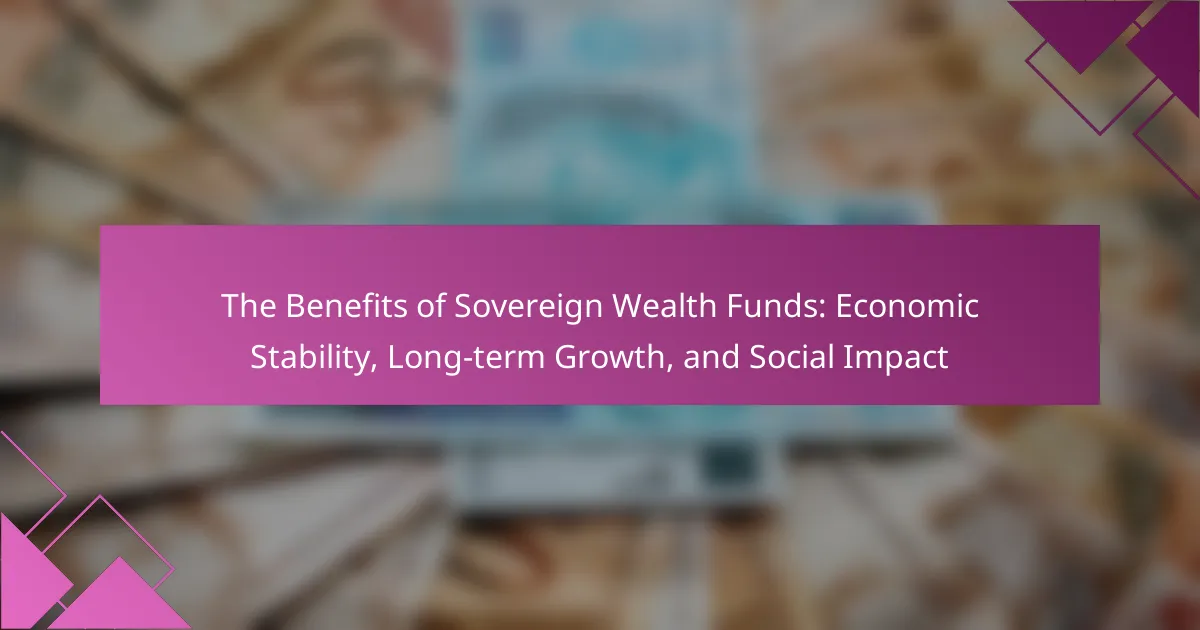
What are Sovereign Wealth Funds?
Sovereign Wealth Funds (SWFs) are state-owned investment funds. They manage national savings for various purposes. These funds typically invest in assets such as stocks, bonds, real estate, and infrastructure. SWFs aim to achieve long-term financial returns. They also help stabilize economies during financial downturns. According to the Sovereign Wealth Fund Institute, there are over 90 SWFs globally, managing trillions in assets. Countries like Norway and China have prominent SWFs that significantly impact their economies.
How do Sovereign Wealth Funds operate?
Sovereign Wealth Funds (SWFs) operate by managing national savings for investment purposes. They invest in a variety of assets, including stocks, bonds, real estate, and infrastructure. These funds are typically funded by surplus revenues from natural resources or fiscal surpluses. SWFs aim to achieve long-term financial returns while contributing to economic stability.
They are often established by governments to secure wealth for future generations. SWFs can also provide liquidity during economic downturns. According to the International Forum of Sovereign Wealth Funds, there are over 90 SWFs globally, managing assets worth trillions of dollars. Their operations are guided by principles of transparency and accountability, promoting responsible investment practices.
What are the key components of Sovereign Wealth Funds?
Sovereign Wealth Funds (SWFs) are state-owned investment funds. They are primarily used to manage a country’s reserves. The key components of SWFs include asset allocation, governance structure, and investment strategy. Asset allocation refers to how funds are distributed across various investment types. This can include equities, fixed income, real estate, and alternative investments. Governance structure outlines the management and oversight of the fund. It typically involves a board of directors and investment committees. Investment strategy defines the approach taken to achieve financial returns. This can vary from aggressive growth strategies to conservative income-focused approaches. These components work together to ensure the fund’s objectives are met effectively.
How do these components influence their effectiveness?
Sovereign wealth funds (SWFs) influence their effectiveness through strategic asset allocation, governance structures, and investment strategies. Strategic asset allocation determines the mix of assets held, impacting returns and risk levels. Governance structures ensure accountability and transparency, which fosters trust and attracts investment. Investment strategies, including diversification and active management, enhance the potential for long-term growth. Research indicates that well-governed SWFs achieve better performance, as seen in the 2019 report by the International Monetary Fund. This report highlights that SWFs with robust frameworks tend to stabilize economies during downturns. Thus, these components collectively enhance the overall effectiveness of sovereign wealth funds.
Why are Sovereign Wealth Funds important for economic stability?
Sovereign Wealth Funds (SWFs) are crucial for economic stability as they provide a buffer against economic shocks. They accumulate surplus revenues, often from natural resources, and invest them globally. This diversification helps stabilize national economies during downturns. For instance, during the 2008 financial crisis, many SWFs acted as stabilizers by investing in distressed assets. Countries like Norway and Singapore have successfully utilized SWFs to manage economic volatility. Additionally, SWFs can support long-term investments in infrastructure and social projects, fostering sustainable growth. Their role in maintaining foreign exchange reserves also enhances a country’s financial resilience.
What role do Sovereign Wealth Funds play in mitigating economic downturns?
Sovereign Wealth Funds (SWFs) play a crucial role in mitigating economic downturns by providing financial stability and liquidity. They act as counter-cyclical buffers during periods of economic stress. SWFs can invest in distressed assets, supporting market stability. For instance, during the 2008 financial crisis, several SWFs invested billions in banks and companies to restore confidence. Their long-term investment strategies help sustain economic growth even in downturns. According to the International Monetary Fund, SWFs can stabilize domestic economies by injecting capital when private investment declines. This stabilizing effect is vital for maintaining employment and public services during economic challenges.
How do Sovereign Wealth Funds contribute to national fiscal health?
Sovereign Wealth Funds (SWFs) contribute to national fiscal health by providing a stable source of revenue for governments. They invest surplus funds from national budgets, often derived from natural resources or trade surpluses. These investments generate returns that can be used to support public spending. For example, SWFs can help stabilize national economies during downturns by providing liquidity. In 2020, the Norway Government Pension Fund, one of the largest SWFs, reported returns of 19.9%, significantly boosting the Norwegian economy. Additionally, they can fund infrastructure projects, thereby stimulating economic growth. By diversifying national income sources, SWFs reduce reliance on volatile revenue streams. This enhances long-term fiscal sustainability and promotes economic resilience.
What long-term growth opportunities do Sovereign Wealth Funds provide?
Sovereign Wealth Funds (SWFs) provide long-term growth opportunities through diversified investments. They invest in various asset classes, including equities, bonds, real estate, and infrastructure. This diversification helps mitigate risks and enhance returns over time. SWFs typically have a long investment horizon, allowing them to capitalize on market fluctuations. They often target emerging markets, which can yield higher growth potential. Additionally, SWFs contribute to national economic stability by providing a buffer during economic downturns. According to the Sovereign Wealth Fund Institute, as of 2023, SWFs manage over $10 trillion in assets globally, indicating their significant impact on long-term financial growth.
How do Sovereign Wealth Funds invest for sustainable growth?
Sovereign Wealth Funds invest for sustainable growth by focusing on long-term returns and responsible investment practices. They allocate capital to a diverse range of assets, including equities, bonds, and real estate. This diversification helps mitigate risks and stabilize returns over time. Many funds incorporate environmental, social, and governance (ESG) criteria into their investment strategies. This approach aligns investments with sustainable practices, promoting positive social and environmental outcomes. For example, the Norway Government Pension Fund Global prioritizes investments in companies with strong ESG ratings. Additionally, these funds often engage in active ownership, influencing companies to adopt sustainable practices. This strategy not only enhances financial performance but also supports broader economic stability and social welfare.
What sectors benefit from investments made by Sovereign Wealth Funds?
Sovereign Wealth Funds (SWFs) invest across various sectors. Key sectors include infrastructure, technology, healthcare, and real estate. Infrastructure investments enhance public services and promote economic growth. Technology funding drives innovation and supports startups. Healthcare investments improve public health systems and access to services. Real estate investments contribute to urban development and housing stability. These sectors benefit from SWF investments due to their potential for long-term returns and positive societal impact.

How do Sovereign Wealth Funds impact social development?
Sovereign Wealth Funds (SWFs) significantly impact social development by financing essential public services and infrastructure projects. They generate revenue for governments, which can be allocated to healthcare, education, and poverty alleviation. For instance, the Government Pension Fund of Norway invests in global markets, with a portion of returns funding social welfare programs domestically.
Moreover, SWFs can stimulate economic growth by investing in sustainable development initiatives. The Abu Dhabi Investment Authority has invested in renewable energy projects, promoting environmental sustainability and job creation.
Additionally, SWFs can enhance social stability by reducing income inequality. By supporting social programs, they contribute to a more equitable distribution of wealth. According to a report by the International Monetary Fund, countries with SWFs often experience improved social indicators, such as reduced child mortality rates and increased literacy levels.
In summary, SWFs positively influence social development through financial support for public services, economic growth initiatives, and efforts to reduce inequality.
What social initiatives are funded by Sovereign Wealth Funds?
Sovereign Wealth Funds (SWFs) fund various social initiatives aimed at improving societal welfare. These initiatives often include education, healthcare, infrastructure development, and poverty alleviation. For instance, some SWFs invest in affordable housing projects to enhance living conditions. Others support renewable energy initiatives to promote environmental sustainability. Additionally, SWFs may fund public health campaigns to improve community health outcomes. They can also contribute to social programs that provide job training and skills development. Specific examples include the Norway Government Pension Fund, which invests in sustainable infrastructure projects globally. These efforts reflect a commitment to social impact alongside financial returns.
How do these initiatives affect community welfare?
Sovereign wealth fund initiatives positively impact community welfare by providing financial resources for public services. These funds can enhance infrastructure, education, and healthcare systems. Increased funding in these areas leads to improved quality of life for residents. For instance, studies show that investments in healthcare can reduce disease prevalence and increase life expectancy. Moreover, enhanced infrastructure promotes economic activities and job creation. According to the International Monetary Fund, countries with strong sovereign wealth funds often experience lower unemployment rates. Overall, these initiatives foster sustainable development and social stability within communities.
What measures are in place to ensure accountability in social investments?
Measures in place to ensure accountability in social investments include transparent reporting and independent audits. These mechanisms provide stakeholders with clear insights into fund performance and allocation. Regular evaluations assess the social impact of investments. Stakeholder engagement fosters collaboration and feedback. Compliance with regulations ensures adherence to ethical standards. Performance metrics track progress against defined goals. These measures collectively enhance trust and responsibility in managing social investments.
How do Sovereign Wealth Funds contribute to global economic stability?
Sovereign Wealth Funds (SWFs) contribute to global economic stability by providing liquidity during financial crises. They invest in diverse assets across various markets. This diversification helps mitigate risks associated with economic downturns. SWFs stabilize local economies by supporting domestic industries. For instance, during the 2008 financial crisis, SWFs invested heavily in distressed assets. This action helped restore investor confidence and stabilize markets. Additionally, SWFs promote long-term investment strategies. They focus on sustainable growth rather than short-term gains. This approach fosters economic resilience globally.
What is the relationship between Sovereign Wealth Funds and international markets?
Sovereign Wealth Funds (SWFs) significantly influence international markets. These state-owned investment funds manage national savings and are often used to stabilize economies. SWFs invest in a diverse range of assets globally, including stocks, bonds, and real estate. Their investments can impact market liquidity and asset prices. For example, in 2020, SWFs globally managed assets worth approximately $9 trillion. This substantial capital allows them to play a critical role in financial markets. Furthermore, SWFs can provide a buffer during economic downturns, offering stability to both domestic and international markets. Their strategic investments can also drive long-term growth in various sectors worldwide.
How do Sovereign Wealth Funds influence foreign investment strategies?
Sovereign Wealth Funds (SWFs) significantly influence foreign investment strategies by providing substantial capital for investment. They often target long-term returns, which shapes their investment choices. SWFs typically invest in diverse asset classes, including equities, real estate, and infrastructure. Their large-scale investments can stabilize markets and attract additional foreign investment. For example, the Government Pension Fund of Norway has invested over $1 trillion globally, impacting various sectors. Additionally, SWFs often engage in strategic partnerships with local firms, enhancing their investment reach. Their presence in emerging markets can boost investor confidence and reduce perceived risks. Overall, SWFs play a crucial role in shaping global investment landscapes through their strategic investment approaches.

What are the challenges faced by Sovereign Wealth Funds?
Sovereign Wealth Funds face several significant challenges. These include market volatility, which can impact investment returns. Political risk is another concern, as changes in government policies can affect fund operations. Additionally, transparency and governance issues can lead to public distrust. Currency fluctuations can also pose risks to international investments. Finally, achieving a balance between short-term gains and long-term goals is often difficult. Each of these challenges can hinder the effectiveness and stability of Sovereign Wealth Funds.
What risks are associated with Sovereign Wealth Fund investments?
Sovereign Wealth Fund investments carry several risks. Market volatility can significantly impact the value of investments. Political risks include changes in government policies affecting asset management. Currency fluctuations may lead to losses in foreign investments. Liquidity risks arise when funds cannot be quickly converted to cash without a loss. Operational risks involve failures in processes or systems managing the fund. Regulatory risks can stem from changes in laws governing investments. Lastly, reputational risks may occur if investments are perceived negatively by the public or stakeholders.
How can Sovereign Wealth Funds mitigate investment risks?
Sovereign Wealth Funds can mitigate investment risks through diversification strategies. By spreading investments across various asset classes, regions, and industries, they reduce exposure to any single economic downturn. For instance, a fund may invest in equities, bonds, real estate, and alternative assets. This multi-faceted approach helps balance potential losses in one area with gains in another. Additionally, these funds often employ risk management frameworks. They analyze market trends and adjust their portfolios accordingly. Historical data shows that diversified portfolios tend to perform better over time, minimizing volatility. Thus, Sovereign Wealth Funds enhance stability and protect against unforeseen market fluctuations.
What are the regulatory challenges faced by Sovereign Wealth Funds?
Sovereign Wealth Funds (SWFs) face several regulatory challenges. These include transparency requirements imposed by international financial standards. Compliance with local and foreign investment regulations can also be complex. Additionally, geopolitical tensions may affect investment decisions and strategies. Legal frameworks vary significantly across countries, leading to inconsistencies. Taxation issues can arise, impacting returns on investments. Furthermore, SWFs must navigate public scrutiny and ethical considerations regarding their investments. These challenges can hinder the operational efficiency of SWFs.
What best practices can enhance the effectiveness of Sovereign Wealth Funds?
Best practices that can enhance the effectiveness of Sovereign Wealth Funds include establishing clear investment objectives. These objectives should align with national economic goals. Transparency in operations is also crucial. Regular reporting and accountability build trust with stakeholders. Diversification of investments across asset classes reduces risk. Adopting a long-term investment horizon promotes stability. Engaging in responsible investment practices supports sustainable development. Collaboration with global financial institutions can provide valuable insights. These practices collectively contribute to the overall success of Sovereign Wealth Funds.
How can transparency improve public trust in Sovereign Wealth Funds?
Transparency can significantly improve public trust in Sovereign Wealth Funds (SWFs). When SWFs operate with transparency, they provide clear information about their investment strategies and financial performance. This openness allows the public to understand how funds are managed and the rationale behind investment decisions. According to the International Monetary Fund (IMF), transparency in SWFs can lead to better governance and accountability. Enhanced transparency reduces the risk of corruption and mismanagement, fostering confidence among stakeholders. Studies show that countries with transparent SWFs tend to experience increased foreign investment and public support. Overall, transparency builds a solid foundation for trust, ensuring that the public feels secure in the management of their national wealth.
What strategies can ensure sustainable returns for future generations?
Sovereign wealth funds can ensure sustainable returns for future generations through diversified investments. Diversification across asset classes reduces risk and enhances stability. Investing in renewable energy supports long-term environmental sustainability. Allocating funds to education and healthcare fosters human capital development. Engaging in responsible investing promotes ethical practices and social responsibility. Regular performance assessments help adapt strategies to changing economic conditions. Transparency in operations builds public trust and accountability. Historical data shows that well-managed sovereign wealth funds achieve positive long-term returns. For example, the Government Pension Fund of Norway has consistently delivered strong returns while promoting sustainable practices.
What practical steps can governments take to optimize their Sovereign Wealth Funds?
Governments can optimize their Sovereign Wealth Funds by implementing strategic investment policies. Establishing clear investment objectives aligned with national interests is crucial. Diversifying the investment portfolio across various asset classes reduces risk. Regular performance assessments ensure funds meet their targets. Engaging experienced fund managers enhances investment decision-making. Transparency in operations builds public trust and accountability. Adopting best practices from successful funds can lead to improved outcomes. These steps have been shown to enhance the effectiveness of Sovereign Wealth Funds globally.
Sovereign Wealth Funds (SWFs) are state-owned investment funds that manage national savings to achieve long-term financial returns and stabilize economies. This article explores the operation, key components, and significance of SWFs in promoting economic stability, long-term growth, and social development. It highlights how SWFs mitigate economic downturns, contribute to national fiscal health, and support various sectors through strategic investments. Additionally, the article addresses the challenges faced by SWFs and discusses best practices for enhancing their effectiveness and ensuring sustainable returns for future generations.
